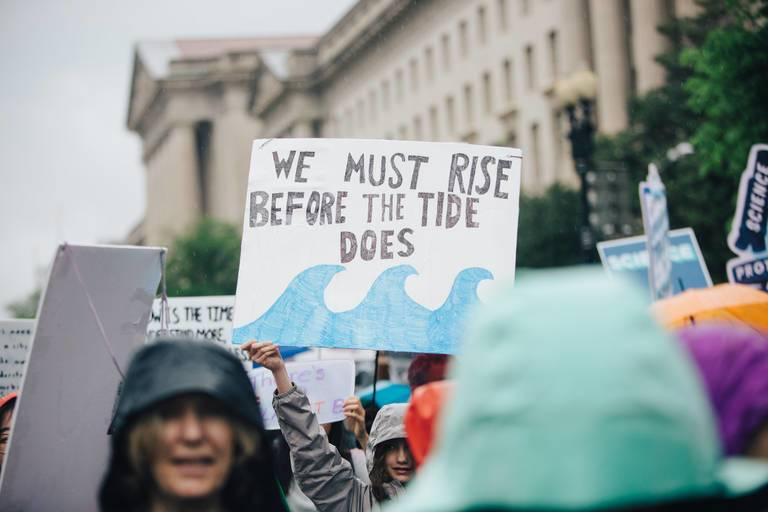
2017 was the year for environmental campaigns, both in North America and abroad. Broad coalitions like the We Are Still In and March for Science signaled, amid loosening of environmental policies in Washington, that the world still supported climate change mitigation and what is more, still believed international consensus was possible.
But bold, public protests on the National Mall were only one indicator this year that climate change remains a fundamental concern across the globe. There has been a growing compendium of research in recent years that implicate oil and gas strategies as the ongoing cause of global warming.
And not surprisingly, there's been growing call by shareholders and asset management companies for industries to be forthright about just what climate change means for those who invest in its future.
Global rallies for science
President Donald Trump's dramatic reduction of funding for federal programs that supported the validity of "climate science" this year not only elicited public comment, it electrified the debate over the role of science in Washington. Some 1 million people attended March for Science rallies across the globe on Earth Day, including 100,000 in Washington DC. According to the University of Delaware Center for Communication, more than 90 percent of those surveyed at the marches felt that the government had a responsibility to consider science based facts in its decision making.
The outpouring of public response on Earth Day set the tone for yet another "rally" barely two months later. Some 2,500 leaders representing a cross-section of governments, businesses and private citizens signed the COP23 or "We Are Still In" declaration on June 5, an answer to the Trump administration's decision to pull the United States out of the Paris Accord.
The March for Science's message was to ensure that science stayed nonpartisan. The COP23 movement, led by leaders from both sides of the political isle, proved that consensus-driven climate action was not only possible, but could continue to grow.
Shareholders take to the floor for climate
But public rallies aren't the only way that Americans have voiced their support for climate-based decisions. Asset management companies, tasked with the safeguarding the value of shareholders' investments, have been speaking out in recent years about the need for oil, gas and other energy industries to embrace both fiscal transparency and divestment from high-emission projects.
“Climate is king … Our research suggests there can be little downside to gradually incorporating climate factors into the investment process — and even potential upside” the BlackRock investment firm wrote in its white paper, Adapting Portfolios to Climate Change last year.
And shareholders have heard the message. Exxon, Occidental Petroleum and PPL, Pennsylvania's largest utility company have registered increasing pressure from investors to inform shareholders of just what prospects climate change may hold for investments in the future.
Lawsuits: the latest arsenal against climate risk
Legal challenges to prove that oil and gas companies have a responsibility for worsening climate change haven't gone well in past years. But the ability of researchers to segregate the causes of carbon emissions and to forecast the environmental impacts has given communities more power in the courts.
CarbonTracker's newest reports on the implications of pollution from high carbon-emitting oil and gas industries has helped highlight the challenges that the global community faces in keeping below a 2 C threshold. The data also calls attention to what communities may face if nations aren't successful in transitioning to a clean energy portfolio.
Communities across that globe have also picked up on that warning. In the US alone, seven cities and counties have sued oil and gas companies this year claiming that the businesses knew their products produced greenhouse gases and increased environmental risks.
The latest, submitted last week by the city and county of Santa Cruz, Calif. strive to encapsulate just what climate change will mean for its coastline.
"Defendants, and each of them, have intentionally, recklessly, or negligently caused flood waters, wildfires, extreme precipitation, landslides, saltwater, and other materials, to enter [the plaintiffs’] property."
Much like private property owners, public entities are viewing the insidious damage from climate change as a kind of private trespass, and holding oil and gas companies responsible for permitting it to happen.
Will the strategy work?
That will ultimately be decided by the courts. But one thing is becoming clear: It's becoming harder for companies to plead ignorance in the face of mounting data.
Cutting-edge research on the nuanced causes of climate change and public advocacy may be next years formidable arsenal against the causes of global warming.
Flickr/Molly Adams
Jan Lee is a former news editor and award-winning editorial writer whose non-fiction and fiction have been published in the U.S., Canada, Mexico, the U.K. and Australia. Her articles and posts can be found on TriplePundit, JustMeans, and her blog, The Multicultural Jew, as well as other publications. She currently splits her residence between the city of Vancouver, British Columbia and the rural farmlands of Idaho.














